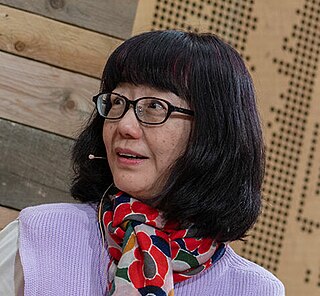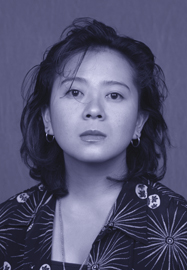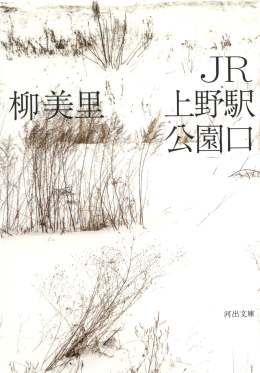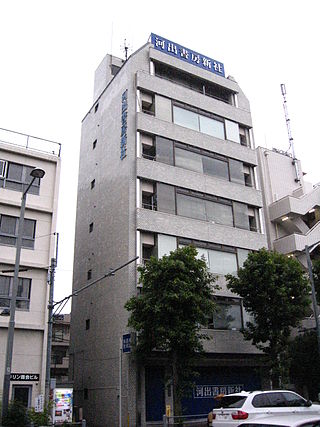Miri Yu | |
|---|---|
 | |
| Native name | 柳美里 |
| Born | June 22, 1968 Tsuchiura, Ibaraki, Japan |
| Occupation | Playwright, novelist, essayist |
| Language | Japanese |
| Nationality | South Korean |
| Notable works |
|
| Notable awards | |
Published in English
- Gold Rush, Welcome Rain. (2002). ISBN 1-56649-283-1. Translated by Stephen Snyder.
- "Specimens of Families" in Zainichi Literature: Japanese Writings by Ethnic Koreans edited by John Lie. (2018). ISBN 1-55729-180-2. Translated by Abbie (Miyabi) Yamamoto.
- Tokyo Ueno Station , Tilted Axis. (2019). ISBN 1911284169. Translated by Morgan Giles.
- The End of August, Riverhead Books. (August 2023). ISBN 978-0593542668. Translated by Morgan Giles.
Related Research Articles

Hiromi Kawakami is a Japanese writer known for her off-beat fiction, poetry, and literary criticism. She has won numerous Japanese literary awards, including the Akutagawa Prize, the Tanizaki Prize, the Yomiuri Prize, and the Izumi Kyōka Prize for Literature. Her work has been adapted for film, and has been translated into more than 15 languages.
Hitomi Kanehara is a Japanese novelist. Her novel Hebi ni piasu won the Shōsetsu Subaru Literary Prize and the Akutagawa Prize, and sold over a million copies in Japan. Her work has been translated into more than a dozen languages worldwide.

Risa Wataya is a female Japanese novelist from Kyoto. Her short novel Keritai senaka won the Akutagawa Prize and has sold more than a million copies. Wataya has also won the Bungei Prize and the Kenzaburo Oe Prize. Her work has been translated into German, Italian, French, Thai, Korean, and English.

The Jōban Line is a railway line in Japan operated by the East Japan Railway Company. The line officially begins at Nippori Station in Arakawa, Tokyo before the line officially ends at Iwanuma Station in Iwanuma, Miyagi. However, following the opening of the Ueno–Tokyo Line, Jōban Line train services originate at Shinagawa or Ueno; likewise, Jōban Line trains continue past Iwanuma onto the Tōhoku Main Line tracks to Sendai. The line approximately parallels the Pacific coasts of Chiba, Ibaraki, and Fukushima Prefectures.

Snakes and Earrings is a Japanese novel by Hitomi Kanehara. The story follows Lui, a young woman in Tokyo whose fascination with body modification and sadomasochistic sexual activity drives her to make increasingly dangerous personal choices. First published in 2003 in the literary magazine Shōsetsu Subaru as the winner of the 27th Subaru Literary Prize, the novel was republished in 2004 after winning the 130th Akutagawa Prize.
Kyōko Hayashi was a Japanese writer associated with the Atomic Bomb Literature genre.
Lee Hoesung is a Zainichi Korean novelist in Japan. He writes under the pen name Ri Kaisei, the Japanese reading of his Korean name. In 1972, he became the first ethnic Korean to win the Akutagawa Prize for his story "The Woman Who Fulled Clothes". Other representative works of his include Mihatenu Yume and Hyakunen no tabibitotachi.

Odaka Station is a railway station in the city of Minamisōma, Fukushima, Japan, operated by East Japan Railway Company.
Nanae Aoyama is a Japanese fiction writer. She has won the Akutagawa Prize, the Bungei Prize, and the Yasunari Kawabata Literary Prize. Her work has been translated into Chinese, Korean, Vietnamese, German, French, English, Italian and Polish.

Chizuko Ueno is a Japanese sociologist and Japan's "best-known feminist". Her work covers sociological issues including semiotics, capitalism, and feminism in Japan. Ueno is known for the quality, polarizing nature, and accessibility of her work. She was married to Daikichi Irokawa.
Mariko Asabuki is a Japanese writer. Her novels have won the Akutagawa Prize and the Bunkamura Deux Magots Prize, and she was named one of Vogue Japan's 2011 Women of the Year.
Yukiko Motoya is a Japanese novelist, playwright, theatre director, and former voice actress. She has won numerous Japanese literary and dramatic awards, including the Akutagawa Prize, the Noma Literary New Face Prize, the Mishima Yukio Prize, the Kenzaburo Oe Prize, the Kishida Kunio Drama Award, and the Tsuruya Nanboku Drama Award. Her work has been adapted multiple times for film.
Yuka Ishii is a Japanese writer. Her book Hyakunen doro won the 154th Akutagawa Prize and the 49th Shincho Prize for New Writers.
Tamaki Daido is a Japanese writer. She has won the Kyushu Arts Festival Literary Prize, the Bunkamura Deux Magots Literary Prize, and the Akutagawa Prize.
Yoshiko Shigekane was a Japanese writer from Hokkaido. She won the Akutagawa Prize in 1979, and her work has been adapted for film.
Haneko Takayama is a Japanese writer. She has won the Akutagawa Prize and the Fumiko Hayashi Literary Prize, and her work has been nominated for the Nihon SF Taisho Award.

Megumu Sagisawa was the pen name of Japanese novelist and writer Megumi Matsuo (松尾めぐみ). Her works of fiction have been described as focusing on topics such as complex interpersonal relationships and the anxieties of the youth.

Chichi to Ran is a short novel by Mieko Kawakami, published by Bungeishunjū in February 2008. It was awarded the 138th Akutagawa Prize. It is part of a "loosely connected trilogy," including Heaven and All the Lovers in the Night. It has not been translated into English.

Tokyo Ueno Station is a 2014 novel by Zainichi Korean author Yū Miri.

Kawade Shobō Shinsha., Ltd., formerly Kawade Shobō (河出書房), is a publisher founded in 1886 in Japan and headquartered in Sendagaya, Shibuya, Tokyo. It publishes the magazine Bungei and administers the Bungei Prize.
References
- 1 2 Doi, Daisuke. "作家・柳美里さんが福島につくった本屋「フルハウス」 絶望した人の「魂の避難場所」に". 好書好日 (Good Life with Books). 朝日新聞社 (Asahi Shimbun). Retrieved 19 March 2021.
- ↑ "Her Antenna Is Tuned to the Quietest Voices (Published 2020)". The New York Times . Archived from the original on 2023-04-22.
- 1 2 3 4 Napack, Jonathan; Tribune, International Herald (April 6, 2002). "A rebel in Japan clings to her freedom (Published 2002)". The New York Times.
- 1 2 http://annx.asianews.network/content/akutagawa-winner-establish-culture-hub-fukushima-70117 [ dead link ]
- ↑ Iwata-Weickgenannt, Kristina (2019). "The roads to disaster, or rewriting history from the margins—Yū Miri's JR Ueno Station Park Exit". Contemporary Japan. 31 (2): 180–196. doi:10.1080/18692729.2019.1578848. S2CID 166752041.
- ↑ "'Tokyo Ueno Station' by Yu Miri wins U.S. book award". The Japan Times . 2020-11-19. Retrieved 2020-11-20.
- ↑ Alter, Alexandra (November 19, 2020). "Charles Yu Wins National Book Award for 'Interior Chinatown'". The New York Times.
- ↑ "Book Break : Yu Miri, Author of "Tokyo Ueno Station"". February 25, 2021. Archived from the original on 2021-12-22 – via youtube.com.
- ↑ "The End of August by Yu Miri: 9780593542675 | PenguinRandomHouse.com: Books". PenguinRandomhouse.com.
- ↑ @yu_miri_0622 (2 April 2021). "受洗から、もうすぐ1年になります。わたしは、昨年の復活徹夜祭に、カトリック原町教会で洗礼を受け、テレサ・ベネディクタという名前を授けられました。アウシュビッツの強制収容所でその生涯を終えた、ユダヤ人哲学者の修道名です。" (Tweet) – via Twitter.
External links
- La Valse de Miri Miri Yu's official Web site Archived 2006-08-24 at the Wayback Machine (in Japanese)
- Miri Yu's unofficial blog (in Japanese)
- Miri Yu's photoblog and diary (in Japanese)
- Miri Yu's other language works list (in Japanese)
- Miri Yu at J'Lit Books from Japan (in English)
- Synopsis of Gold Rush at JLPP (Japanese Literature Publishing Project) (in English)